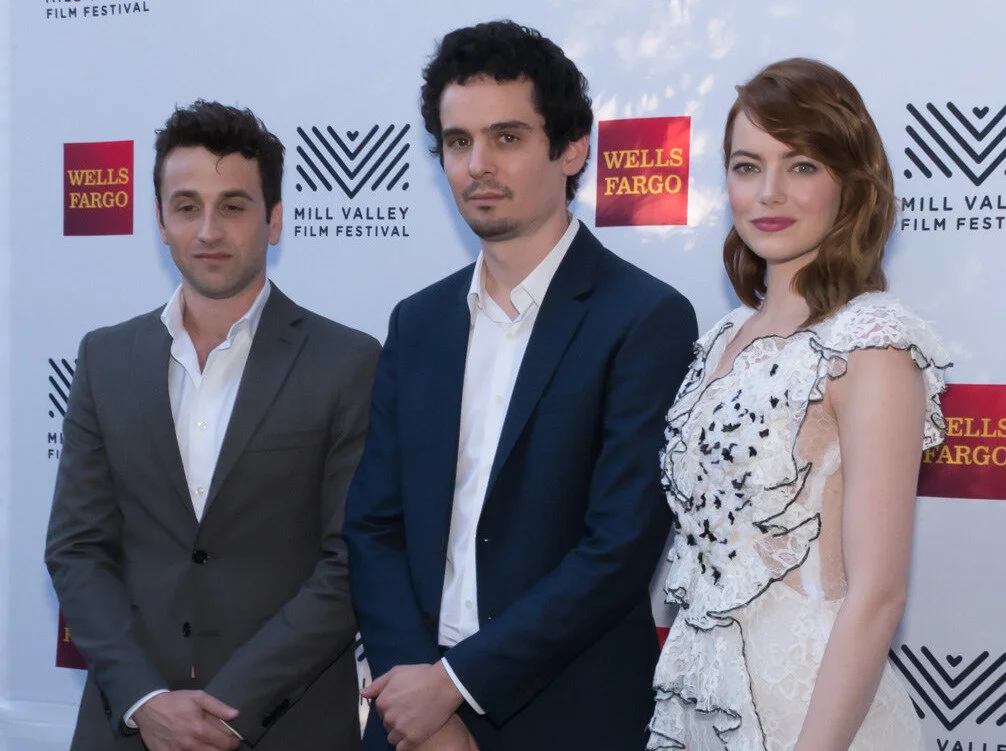Damien Chazelle imparts career reflections, advice to Chapman students
Academy Award-winning writer and director Damien Chazelle (center) joined a March 31 Dodge College of Film and Media Arts master class for a down-to-earth conversation about his career. From left to right: Justin Hurwitz, Damien Chazelle, Emma Stone. WikiCommons
Many of us just need to hear Damien Chazelle’s name to envision a specific set of images. Think, say, Emma Stone in a yellow dress. Ryan Gosling shuffling his black and white tap shoes through the hills of Hollywood. Maybe even the Best Picture mix-up at the 2017 Oscars.
As the man who wrote and directed 2016’s “La La Land” and 2014’s “Whiplash,” Chazelle has garnered widespread critical acclaim for his talents. He is the youngest person in history to receive the Academy Award for Best Director.
But from listening to him speak, if they didn’t know Chazelle’s name, the average person probably wouldn’t know any of that.
Over 550 participants logged into a Zoom call March 31 to listen to Chazelle speak at a master class hosted by Chapman’s Dodge College of Film and Media Arts. When it came time for the Q&A section, over 50 people raised their hands, eagerly awaiting a chance to gush over Chazelle’s work and receive advice about their career aspirations. The Zoom gallery was littered with backgrounds featuring posters of “La La Land,” yet Chazelle still received every compliment he was given with a look of slight surprise and genuine gratitude.
During the master class Chazelle reflected on his transition from studying visual art at Harvard University to taking the leap and working in the film industry.
“My real foothold into the industry was writing low-budget genre scripts: horror, sci-fi,” Chazelle said. “For a moment it didn’t matter that it wasn’t the movies that I wanted to be doing necessarily, it was just like, ‘Oh my God, I’m getting paid to write,’ and that already felt like winning the lottery. It still does in many ways.”
His grounded humility stood out to freshman screenwriting major Molly Rose Freeman, who described him and the overall event as “approachable and accessible.” Freeman was among the students able to pose Chazelle a question March 31, asking his thoughts on choosing whether to focus on writing or directing.
“I definitely didn’t think he would be snooty or anything like that, but I was surprised by how down-to-earth he was,” Freeman said. “I was obviously super nervous, because I’m such a huge fan of his, but it was easy to talk to him and easy to learn from him.”
Perhaps Chazelle’s amicable relationship with Stephen Galloway, dean of Dodge College and moderator of the event, helped create a comfortable atmosphere that enhanced the director’s approachability. Formerly the executive editor of The Hollywood Reporter, Galloway had met Chazelle several times when reporting on the 2017 awards circuit, and profiled him in 2018 while the young director was making “First Man.”
Galloway told The Panther he wanted to make sure students saw Chazelle as a real person, hoping the director would describe some of his low points to balance out the highs. He structured his first question around that goal.
“I want to start with a terrible moment. You’ve come to (Los Angeles) and Focus Features says they’re going to make your movie,” Galloway said to Chazelle at the master class. “They’re not going to give you a lot of money — it’s a million dollars, the movie was not even called ‘La La Land’ at that point — and then they tell you they’re putting it in turnaround. Where were you then, how did you feel and how did you regroup?”
Chazelle paused for a moment, letting out a small chuckle before answering.
“Since then, I’ve learned a little more. These are sort of the ups and downs you have to expect,” Chazelle responded. “But I was riding so hard on this (being) my thing and I was going to get to make this movie. Then as often happens, there was a little regime change, a little (executive) shuffle, and the producers called to tell me that they had gotten the call that we were being summarily kicked to the curb.”
The exchange humanized Chazelle in the eyes of students like Melissa Cho, a senior double major in theater and broadcast journalism and documentary.
“What was so special about (Chazelle’s) master class was that he is really young and he still has a lot of solid and fresh advice that hasn’t expired yet,” Cho said. “It’s nice being reminded that as much of a platitude as it might sound, everything happens for a reason. I was also reminded that any hurdles or limitations that are thrown at you could actually be seen as a good thing in the end, because they allow you to think quickly and creatively.”
Galloway’s initial question set the tone for an honest and casual conversation, leading Chazelle to be further transparent about the fluctuations in his career. Galloway said he was delighted that Chazelle maintained his authentic personality in his career despite his success.
“I’m very interested in human psychology,” Galloway told The Panther. “Even as someone like Damien is answering questions that may be useful for students, I’m much more interested in seeing how Damien comes across at this point in his career. I was charmed to see that he’s still stumbling, neurotic, tired; these very human qualities that I kind of love. To me, that was a very appealing thing, to realize you can be at his level and still keep these very ordinary, good human traits.”

